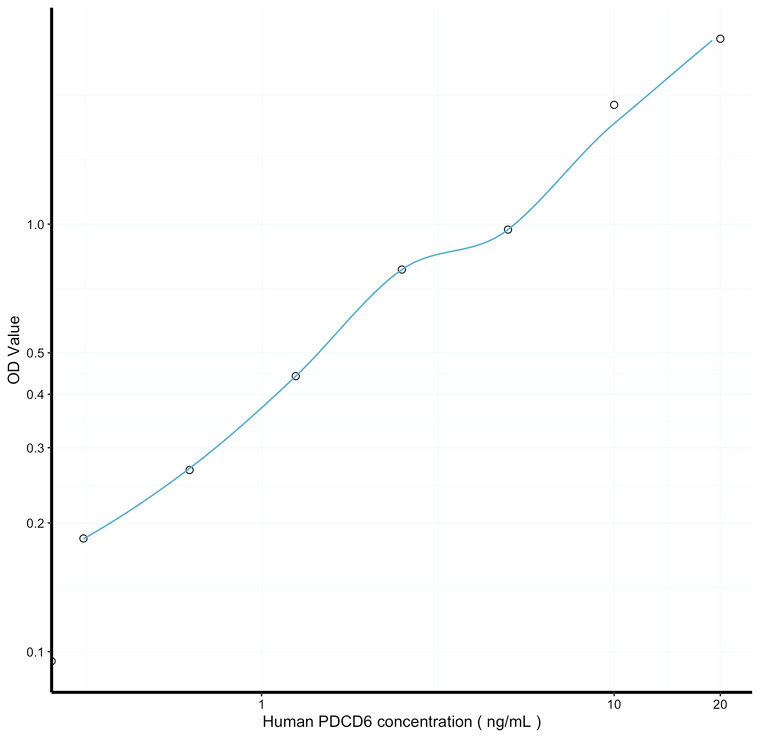| Applications: |
ELISA |
| Reactivity: |
Human |
| Note: |
STRICTLY FOR FURTHER SCIENTIFIC RESEARCH USE ONLY (RUO). MUST NOT TO BE USED IN DIAGNOSTIC OR THERAPEUTIC APPLICATIONS. |
| Sensitivity: |
0.118ng/mL |
| Detection Limit: |
0.312-20ng/mL |
| Short Description: |
This PDCD6 Sandwich ELISA Kit is an in-vitro enzyme-linked immunosorbent assay for the measurement of samples in human cell culture supernatant, serum and plasma (EDTA, citrate, heparin). |
| Storage Instruction: |
Store the unopened kit in the fridge at 2-8°C for up to 6 months. Once opened store individual kit contents according to components table provided with the kit. |
| Assay Time: |
4.5 hrs |
| Gene Symbol: |
PDCD6 |
| Gene ID: |
10016 |
| Uniprot ID: |
PDCD6_HUMAN |
| Sample Type: |
tissue homogenates or other biological fluids. |
| Tissue Specificity | |
| Post Translational Modifications | |
| Function | Calcium sensor that plays a key role in processes such as endoplasmic reticulum (ER)-Golgi vesicular transport, endosomal biogenesis or membrane repair. Acts as an adapter that bridges unrelated proteins or stabilizes weak protein-protein complexes in response to calcium: calcium-binding triggers exposure of apolar surface, promoting interaction with different sets of proteins thanks to 3 different hydrophobic pockets, leading to translocation to membranes. Involved in ER-Golgi transport by promoting the association between PDCD6IP and TSG101, thereby bridging together the ESCRT-III and ESCRT-I complexes. Together with PEF1, acts as calcium-dependent adapter for the BCR(KLHL12) complex, a complex involved in ER-Golgi transport by regulating the size of COPII coats. In response to cytosolic calcium increase, the heterodimer formed with PEF1 interacts with, and bridges together the BCR(KLHL12) complex and SEC31 (SEC31A or SEC31B), promoting monoubiquitination of SEC31 and subsequent collagen export, which is required for neural crest specification. Involved in the regulation of the distribution and function of MCOLN1 in the endosomal pathway. Promotes localization and polymerization of TFG at endoplasmic reticulum exit site. Required for T-cell receptor-, Fas-, and glucocorticoid-induced apoptosis. May mediate Ca(2+)-regulated signals along the death pathway: interaction with DAPK1 can accelerate apoptotic cell death by increasing caspase-3 activity. Its role in apoptosis may however be indirect, as suggested by knockout experiments. May inhibit KDR/VEGFR2-dependent angiogenesis.the function involves inhibition of VEGF-induced phosphorylation of the Akt signaling pathway. In case of infection by HIV-1 virus, indirectly inhibits HIV-1 production by affecting viral Gag expression and distribution. Isoform 2: Has a lower Ca(2+) affinity than isoform 1. |
| Protein Name | Programmed Cell Death Protein 6Apoptosis-Linked Gene 2 Protein HomologAlg-2 |
| Database Links | |
| Cellular Localisation | Endoplasmic Reticulum MembranePeripheral Membrane ProteinCytoplasmic VesicleCopii-Coated Vesicle MembraneCytoplasmNucleusEndosomeInteraction With Rbm22 Induces Relocalization From The Cytoplasm To The NucleusTranslocated From The Cytoplasm To The Nucleus After Heat Shock Cell TreatmentAccumulates In Cytoplasmic Vesicle-Like Organelles After Heat Shock TreatmentWhich May Represent Stress GranulesIn Response To Calcium IncreaseRelocates From Cytoplasm To Copii Vesicle CoatLocalizes To Endoplasmic Reticulum Exit Site (Eres) |
| Alternative ELISA Names | Programmed Cell Death Protein 6 ELISA kitApoptosis-Linked Gene 2 Protein Homolog ELISA kitAlg-2 ELISA kitPDCD6 ELISA kitALG2 ELISA kit |
| output | |
Information sourced from Uniprot.org
12 months for antibodies. 6 months for ELISA Kits. Please see website T&Cs for further guidance







